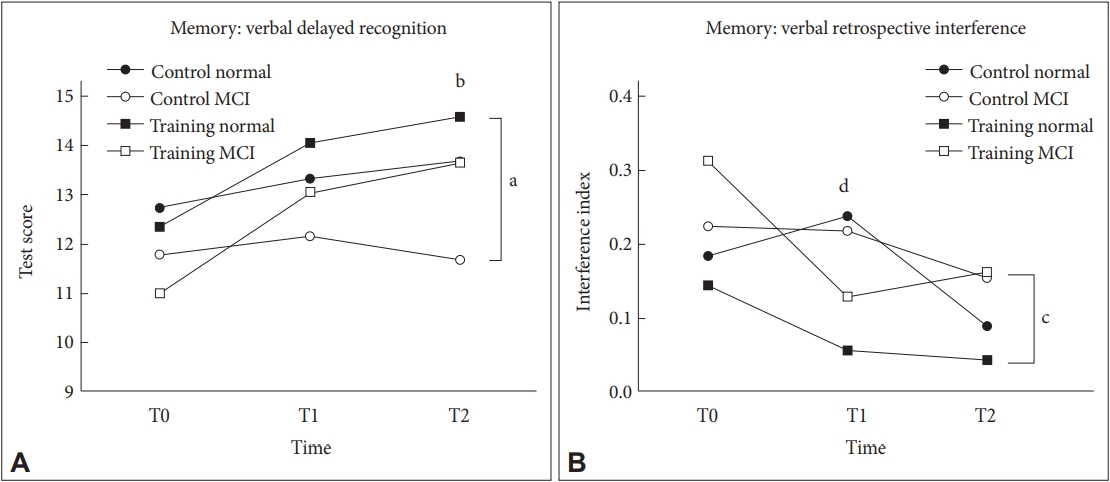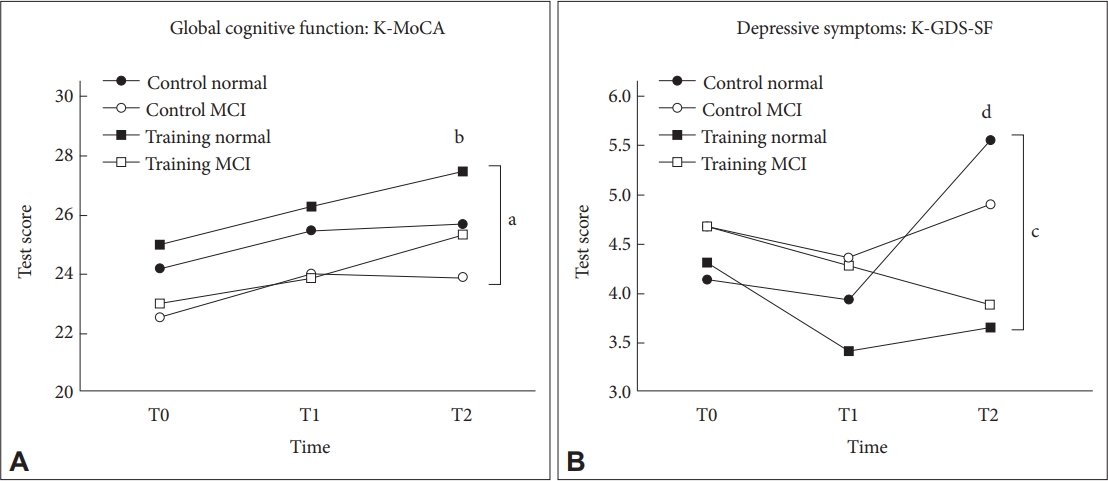 |
 |
- Search
| Psychiatry Investig > Volume 17(8); 2020 > Article |
|
Abstract
Objective
Methods
Results
ACKNOWLEDGEMENTS
The authors have no potential conflicts of interest to disclose.
Author Contributions
Conceptualization: Minyoung Shin, Ahee Lee, Yun-Hee Kim. Data curation: Ahee Lee, A Young Cho, Minam Son. Formal analysis: Minyoung Shin. Funding acquisition: Yun-Hee Kim. Investigation: Minyoung Shin, Ahee Lee. Methodology: Minyoung Shin, Ahee Lee, A Young Cho, Minam Son. Project administration: Yun-Hee Kim. Resources: Yun-Hee Kim. Software: Minyoung Shin, Ahee Lee, Yun-Hee Kim. Supervision: Yun-Hee Kim. Validation: Minyoung Shin, Ahee Lee, Yun-Hee Kim. Visualization: Minyoung Shin. Writing—original draft: Minyoung Shin. Writing—review & editing: Yun-Hee Kim.
Figure 2.

Figure 3.

Table 1.
|
Control group (N=34) |
Experimental (training) group (N=35) |
t/χ2 | |||||
|---|---|---|---|---|---|---|---|
| All (N=34) | Healthy (N=15) | MCI (N=19) | All (N=35) | Healthy (N=17) | MCI (N=18) | ||
| Age, M (SD) | 65.44 (8.10) | 61.33 (6.49) | 68.68 (7.90) | 65.31 (7.47) | 62.00 (6.50) | 68.44 (7.11) | 0.068 |
| Education, M (SD) | 11.71 (3.72) | 12.60 (2.53) | 11.00 (4.38)* | 13.26 (3.47) | 12.71 (3.33) | 13.78 (3.61)* | -1.792 |
| Sex, M:F | 8:26 | 4:11 | 4:15 | 9:26 | 3:14 | 6:12 | 0.044 |
Table 2.
| Measures |
Control group |
Experimental (training) group |
RMANOVA |
ANCOVA |
|||||
|---|---|---|---|---|---|---|---|---|---|
| T0 | T1 | T2 | T0 | T1 | T2 | F | F (T1) | F (T2) | |
| Global cognitive function | |||||||||
| MoCA-K | 23.26±2.59 | 24.65±3.30 | 24.68±2.87 | 23.97±3.48 | 25.06±2.87 | 26.37±3.48 | 3.35* | 0.22 | 5.21* |
| Attention | |||||||||
| Digit span forward† | 5.56±1.65 | 5.76±1.48 | 5.91±1.22 | 5.71±1.24 | 6.38±1.16 | 6.65±1.04 | 4.60* | 3.68 | 11.77** |
| Digit span backward† | 4.35±1.20 | 4.21±0.95 | 4.35±1.39 | 4.38±1.33 | 4.76±1.26 | 4.97±1.24 | 4.68* | 8.02** | 2.61 |
| Visual span forward† | 5.12±1.37 | 5.38±1.02 | 5.71±0.91 | 5.50±1.05 | 5.65±0.85 | 5.62±0.95 | 1.06 | 0.40 | 0.58 |
| Visual span backward | 5.26±0.99 | 5.35±1.04 | 5.24±1.05 | 4.85±1.18 | 5.03±1.03 | 5.32±0.73 | 1.98 | 2.12 | 0.29 |
| ACPT_rt† | 0.69±0.06 | 0.68±0.05 | 0.67±0.05 | 0.68±0.07 | 0.67±0.07 | 0.67±0.09 | 1.08 | 0.26 | 0.91 |
| VCPT_rt† | 0.45±0.06 | 0.45±0.05 | 0.45±0.05 | 0.44±0.06 | 0.44±0.06 | 0.44±0.07 | 0.01 | 0.01 | 0.03 |
| Memory | |||||||||
| Learn total | 43.09±8.91 | 50.76±14.13 | 56.15±14.11 | 46.85±9.66 | 54.85±11.64 | 60.85±11.59 | 0.20 | 0.01 | 0.48 |
| Learn index | 5.74±2.37 | 5.62±2.19 | 3.79±3.49 | 6.29±2.21 | 5.59±2.56 | 3.74±2.39 | 0.58 | 0.06 | 3.17 |
| Delayed recall† | 9.06±2.71 | 10.35±3.28 | 11.41±3.48 | 9.76±3.24 | 11.53±3.26 | 12.71±3.19 | 0.50 | 0.42 | 1.82 |
| Delayed recognition† | 12.21±2.16 | 12.68±2.66 | 12.56±3.32 | 11.68±3.91 | 13.56±1.65 | 14.12±1.65 | 4.02* | 4.14* | 6.70* |
| Percentage of forgetting | 0.19±0.12 | 0.18±0.17 | 0.12±0.18 | 0.19±0.20 | 0.13±0.17 | 0.09±0.20 | 0.63 | 1.89 | 0.84 |
| Proactive interference | -0.01±0.45 | 0.04±0.74 | 0.38±0.35 | -0.07±0.44 | 0.14±0.37 | 0.38±0.30 | 0.63 | 0.75 | 1.89 |
| Retroactive interference† | 0.21±0.17 | 0.23±0.18 | 0.12±0.17 | 0.23±0.24 | 0.09±0.14 | 0.10±0.18 | 7.04** | 14.04*** | 0.91 |
| Executive function | |||||||||
| Stroop interference† | 2.10±0.77 | 1.92±0.62 | 1.79±0.41 | 2.15±0.61 | 1.94±0.56 | 1.84±0.56 | 0.09 | 0.04 | 0.10 |
| TMT B_rt | 85.53±43.14 | 77.44±39.70 | 73.97±40.97 | 86.35±29.74 | 80.18±25.51 | 72.88±33.00 | 0.12 | 1.92 | 0.54 |
| Depression | |||||||||
| K-GDS-SF | 4.44±3.48 | 4.18±2.79 | 5.18±4.01 | 4.49±3.67 | 3.86±3.01 | 3.77±3.73 | 3.58* | 0.27 | 7.42** |
RMANOVA was carried out with age, sex, and education as covariates. ANCOVA was carried out with age, sex, education, and test score at T0 as covariates.
T0, pre-intervention; T1, post-intervention; T2, four-week follow-up. MoCA-K: Korean Version of the Montreal Cognitive Assessment, ACPT_rt: Auditory Continuous Performance Test_reaction time, VCPT_rt: Visual Continuous Performance Test_reaction time, TMT B_rt: Trail Making Test B_ reaction time, K-GDS-SF: Korean Version of the Geriatric Depression Scale Short Form, RMANOVA: repeated measure analysis of variance, ANCOVA: analysis of covariance
Table 3.
| Measures |
RMANOVA |
ANCOVA |
|||||||||
|---|---|---|---|---|---|---|---|---|---|---|---|
| Df |
F |
Df |
F |
||||||||
| Time×training | Time×MCI | Time×training×MCI |
Post intervention |
Four weeks after intervention |
|||||||
| Training | MCI | Training×MCI | Training | MCI | Training×MCI | ||||||
| Global cognitive function | |||||||||||
| MoCA-K | 2 | 3.23* | 0.06 | 0.24 | 1 | 0.18 | 0.14 | 2.11 | 5.13*** | 0.00 | 0.24 |
| Attention | |||||||||||
| Digit span forward† | 2 | 4.53* | 0.34 | 1.64 | 1 | 3.51 | 0.54 | 1.44 | 11.29* | 0.83 | 0.00 |
| Digit span backward† | 2 | 4.60* | 0.09 | 0.84 | 1 | 7.83** | 0.20 | 0.52 | 2.47 | 0.03 | 0.17 |
| Visual span forward† | 2 | 1.37 | 1.22 | 2.72 | 1 | 0.37 | 0.37 | 0.51 | 0.58 | 0.10 | 0.00 |
| Visual span backward | 2 | 0.02 | 2.27 | 1.28 | 1 | 2.01 | 0.28 | 0.84 | 0.16 | 0.06 | 0.70 |
| ACPT_rt | 2 | 0.95 | 0.74 | 0.40 | 1 | 0.05 | 0.34 | 1.35 | 0.25 | 0.05 | 0.80 |
| VCPT_rt | 2 | 1.87 | 0.61 | 0 .18 | 1 | 0.02 | 0.97 | 0.56 | 0.05 | 2.92 | 0.92 |
| Memory | |||||||||||
| Learn total | 2 | 0.22 | 0.78 | 0.17 | 1 | 0.01 | 0.68 | 0.20 | 0.47 | 0.13 | 0.11 |
| Learn index | 2 | 0.55 | 0.66 | 1.07 | 1 | 0.04 | 2.09 | 1.74 | 0.12 | 0.04 | 0.31 |
| Delayed recall | 2 | 0.50 | 0.01 | 0.09 | 1 | 0.40 | 0.01 | 0.04 | 1.75 | 0.00 | 0.01 |
| Delayed recognition† | 2 | 4.02* | 0.05 | 0.64 | 1 | 3.99 | 0.01 | 0.01 | 6.53* | 0.02 | 0.26 |
| Percentage of forgetting | 2 | 0.62 | 0.65 | 1.68 | 1 | 1.93 | 0.23 | 5.08* | 0.77 | 0.48 | 0.00 |
| Proactive interference | 2 | 0.64 | 0.01 | 0.75 | 1 | 0.74 | 0.01 | 0.84 | 0.22 | 0.08 | 2.84 |
| Retroactive interference† | 2 | 7.26** | 1.20 | 0.40 | 1 | 14.09*** | 0.71 | 0.75 | 0.88 | 0.01 | 0.08 |
| Executive function | |||||||||||
| Stroop interference | 2 | 0.08 | 3.05 | 0 .01 | 1 | 0.07 | 2.59 | 0.74 | 0.16 | 5.13* | 0.91 |
| TMT B_rt | 2 | 0.11 | 0.29 | 0.10 | 1 | 1.84 | 0.33 | 0.90 | 0.54 | 0.06 | 0.20 |
| Depression | |||||||||||
| K_GDS_SF | 2 | 3.66* | 0.56 | 0.56 | 1 | 0.29 | 0.05 | 0.77 | 7.68** | 0.58 | 1.07 |
RMANOVA was carried out with age, sex, and education as covariates. ANCOVA was carried out with age, sex, education, and test score at pre-intervention as covariates.
MoCA-K: Korean Version of the Montreal Cognitive Assessment, ACPT_rt: Auditory Continuous Performance Test_reaction time, VCPT_rt: Visual Continuous Performance Test_reaction time, TMT B_rt: Trail Making Test B_ reaction time, K-GDS-SF: Korean Version of the Geriatric Depression Scale Short Form, RMANOVA: repeated measure analysis of variance, ANCOVA: analysis of covariance
REFERENCES








